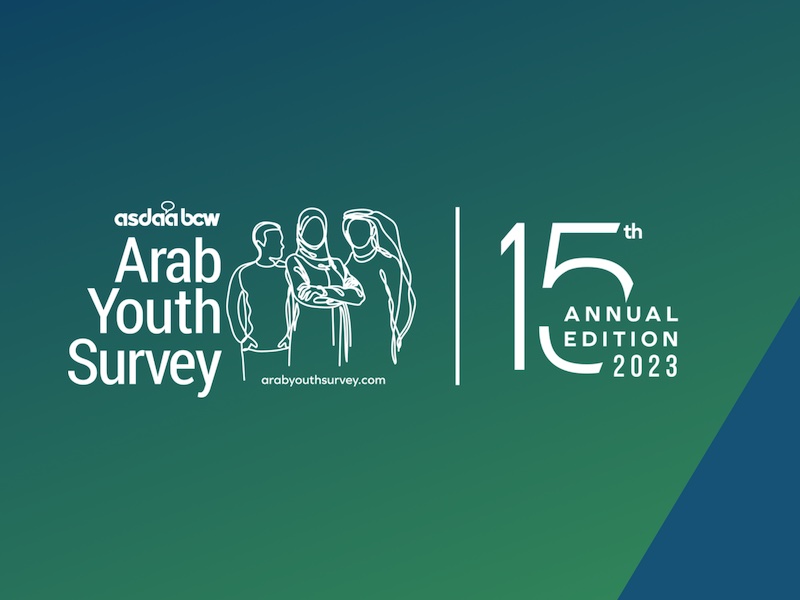Maja Pawinska Sims 30 Jun 2023 // 5:15PM GMT

DUBAI — The 15th annual Asda’a BCW Arab Youth Survey has highlighted shifting geopolitical allegiances in the Arab world, with young people across the Middle East and North Africa saying they now view Turkey and China as stronger allies of their country than the US or Russia.
The Arab Youth Survey is the largest survey of the biggest demographic in the region – with more than 2 million young people – and explores the hopes, fears and aspirations of young Arabs in 53 cities in 18 states across the Middle East and North Africa.
For the 2023 survey, face-to-face interviews were conducted with 3,600 Arab citizens aged 18 to 24 in March and April by research company SixthFactor Consulting. The cohort was split equally between men and women.
The survey covered five Gulf Cooperation Council states (Bahrain, Kuwait, Oman, Saudi Arabia and the UAE), North Africa (Algeria, Egypt, Libya, Morocco, Sudan, Tunisia and, for the first time, South Sudan), the Levant region (Jordan, Iraq, Lebanon, Palestinian Territories, Syria) and Yemen.
Asda’a BCW has so far released the findings of the first of six parts of the survey, ‘My Citizenship’, under the overarching theme ‘Living a New Reality’.
In the coming weeks, the agency will publish insights from the other five themes: My Politics, revealing what young Arab say about the performance of their government; My Livelihood, detailing their views on education, jobs, and their finances; My Identity, covering religion and issues of personal identity; My Aspirations, the hopes of young Arabs for the future; and My Lifestyle, highlighting their habits, pastimes, and the media they consume.
Findings on climate change, mental health and gender rights will also be disclosed, making this year’s study the most extensive in the survey’s history.
Asda’a BCW founder and BCW MENA president Sunil John, who has led the thought leadership initiative over the past 15 years, told PRovoke Media that the Arab Youth Survey was his “passion project”: “The reason we started this 2008 is simply because if you want to understand the Arab world you need to understand the hearts and minds of youth, and there wasn’t much data on the biggest demographic in the region.
“You can literally see the Arab Spring happening in the first surveys – in 2009 the top finding was that young people wanted to live in a democracy and have a better education system – if only people had listened. There was no voice and we’ve given Arab youth a voice.
“It’s been an opportunity to create something of great value that can benefit governments, business, academics and media, and it has clearly informed policy-making across the region and business strategy development. We now present the findings to government ministers and think tanks, heads of state share results of the survey, and it’s been picked up by international media like CNN, the Financial Times and the Economist.”
In the ‘My Citizenship’ findings, 82% of Arab youth named Turkey as a ‘strong ally’ or ‘somewhat of an ally of their country’, followed by China (80%), the UK (79%), Germany (78%) and France (74%). The US ranked seventh, with 72% votes, just below India at 73%.
The US and UK, however, continue to be seen as a ‘strong ally’ by more than half of those surveyed, while two-thirds (66%) said America would be a stronger ally of their nation than Russia or China in the next five years. Russia, a top-three ally in last year’s study, now ranks in ninth place, rated as an ally by 63% of respondents, below Pakistan (69%).
At the same time, they say the US continues to exert the most influence in the Arab world. Compared to only 3% naming Turkey as having the most influence, and 4% identifying China, a third of young Arabs (33%) say the US is the most influential, followed by the UAE (11%), Saudi Arabia and Israel (both on 10%), and Russia (8%).
However, most would like the US to be less involved in Middle Eastern affairs, with nearly two-thirds across the GCC, North Africa and the Levant countries saying they ‘strongly or somewhat support’ US disengagement from the region.
In addition, the survey found that most young Arabs are pessimistic about the prospects for peace in the Palestinian Territories, and around two-thirds of young Arabs (60%) say that relations between Iran and Israel and the West will deteriorate into military conflict. Many expect the Iranian regime to become even more authoritarian in the future, with nearly a third saying Iran will experience more civil unrest and possibly a coup.
For the 12th consecutive year since young Arabs were asked to name the countries they consider ‘model nations’, they said the United Arab Emirates is the country they would most like to live in and the one they would most like their own to be like. The US and Canada were ranked second and third, respectively, for the third year running.
Three GCC nations, the UAE, Saudi Arabia and Qatar, appear in Arab youth’s top-five list of model nations for the first time in nine years. Young Arab men and women now say they would rather live in Qatar than the UK, while Saudi Arabia ranks joint-fifth with the UK in their list of countries they most want their own to emulate.



































.jpg)

















